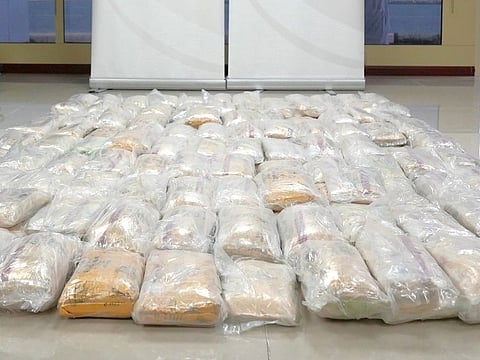Revealed: The cutting-edge technologies helping Dubai Customs foil sophisticated drug smuggling bids
AI, drones aided inspectors make 1,273 seizures at borders and sea and air ports in 2023

Dubai: Dubai Customs have revealed details about some of the technologies used in anti-drug operations, announcing on Sunday that it made 1,273 drug seizures at land borders and sea and air ports in the emirate last year.
The seized drugs included Tramadol tablets, Captagon, opium, heroin, cannabis seeds, marijuana, restricted narcotics and other drugs.
Early warning system
Adel Al Suwaidi, Director of Technical Support Department, said: “Dubai Customs adopts an integrated series of procedures and technologies to deter all the smuggling attempts, starting with the ‘early warning’ technology represented by the Smart Risk Engine to help identify all suspicious shipments in advance, to inspection operations, where various inspection methods - such as the manual inspection, the X-ray scanning, or sniffer dog - are applied.”
Auto checks on sea vessels
Dubai Customs has equipped the Jebel Ali and TECOM Customs Centre with a “first-of-its-kind” advanced system in the world for inspecting heavy and light vehicles, equipment, and yachts through X-ray scanning.
This system allows the centre to double its inspection operations and accelerate procedures, supporting the flow of business and trade and enhancing the position of Jebel Ali Port as the largest port in the Middle East and one of the most important ports globally, as the device shortens inspection time from around six hours manually to only five minutes.
Siyaj system
Siyaj is a smart and integrated security system to monitor customs ports in the emirate of Dubai. The system is based on several technologies such as AI, binocular technique, drones, electric cars, and other “unique devices” to detect contraband and dangerous substances.
The system uses a centralised database that is periodically updated, high-quality cameras covering all parts of the customs campus, sensors, and radars to control the movement of goods for analysis and suspicion, and a boat equipped with advanced systems able to monitor ships’ entry into the ports and report any risks that the ships may be carrying.
Operation Wheelhouse
Sharing a case, called Operation Wheelhouse, Dubai Customs said it managed to thwart the smuggling of 234.68kg of hashish into UAE. One of the dhows (traditional wooden ships) coming to the Creek Customs Centre and Deira Port was suspected. The ship was subjected to a thorough inspection process in which the “endoscope” technology was used. An endoscope, in security sector terms, is a device designed to inspect confined spaces and provide a high-quality image even in the dark in order to detect prohibited items. During the inspection process, narcotic drugs were found hidden inside the ship cockpit.
Cross-border operations
Mohammed Abdullah Al Suwaidi, Senior Manager of Intelligence Operations, said Dubai Customs have enabled many customs authorities worldwide to thwart attempts to smuggle drugs. Among these seizures, Dubai Customs helped an Asian country seize up to 700kg of Methamphetamine powder valued at around $310 million, which were concealed within a cargo ship. The seizure stands as the second-largest drug confiscation ever made in that country.
Five-year plan
Mansoor Al Malik, executive director for policies and legislation division at Dubai Customs, said the department’s 2021-2026 plan has been given “tremendous priority given the increasing threats [of drugs]”.
“The department is committed to cooperating fully with strategic partners from the security authorities to thwart any attempt to smuggle drugs to achieve the objectives of the Dubai Council’s Objectives for Border Port Security and Continuous Development Operations aimed at enhancing the emirate’s security capabilities in protecting border ports,” he added.
Rashid Al Dhabbah Al Suwaidi, Acting Director of Sea Customs Management, said total seizures during the past year amounted to 3,735, including 1,273 drug seizures. He pointed out that the Emiratisation rate for Dubai Customs inspection officers has reached 100 per cent now.
“We seek to expedite customs procedures for commercial shipments to strengthen Dubai’s pivotal role in global trade. We also firmly counter the different ways of smuggling drugs,” he added.
Efficiency of inspectors
Ibrahim Al Kamali, Director of the Passenger Operations Department, said: “Inspectors at airports have advanced capabilities to detect drug smuggling attempts through inspection and monitoring with advanced inspection devices at airports, in addition to the high skill and ability to read the body language of people who try to smuggle drugs by hiding them in the bowels or hiding them in new ways in their luggage and bags.”
Sign up for the Daily Briefing
Get the latest news and updates straight to your inbox


